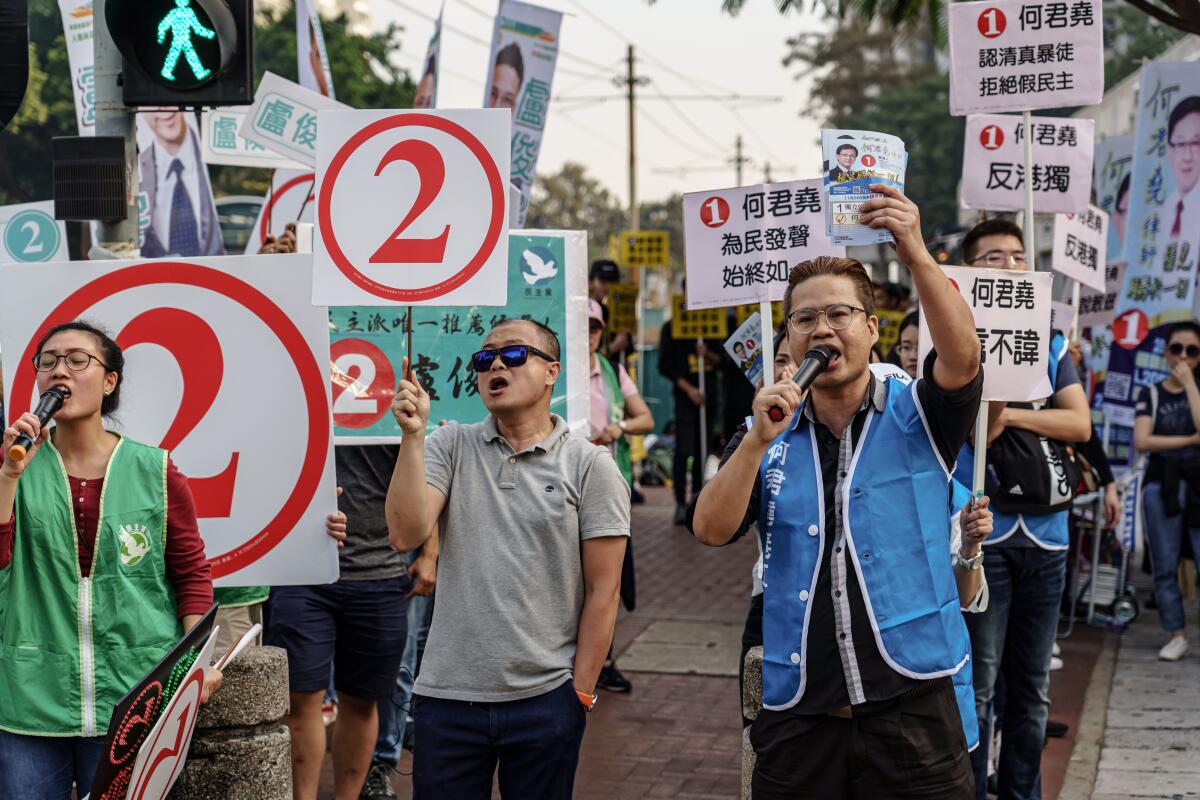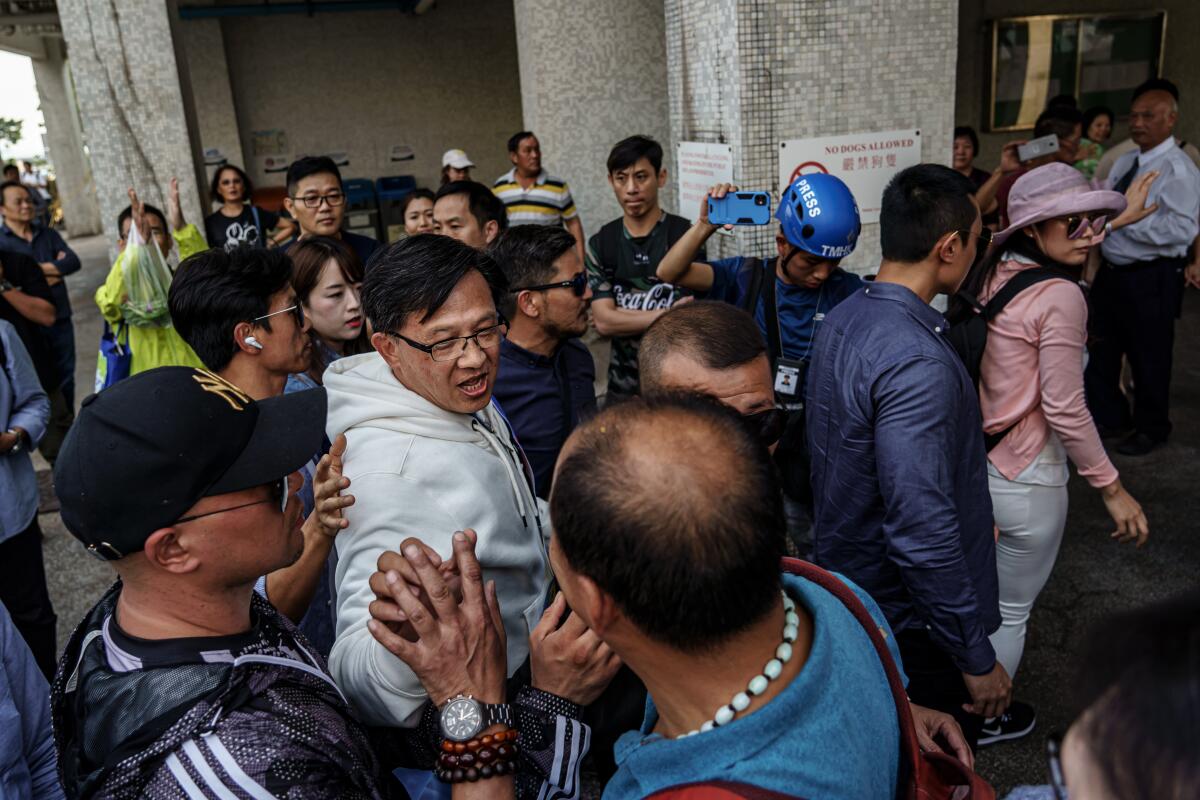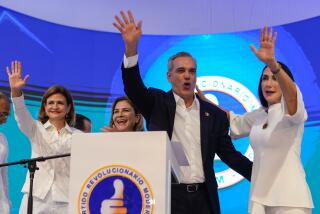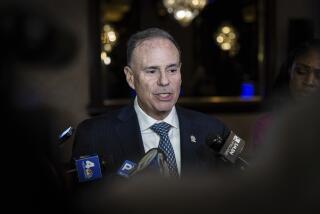Massive voter turnout in Hong Kong propels pro-democracy candidates to victory

HONG KONG — In nearly six months of unprecedented unrest in Hong Kong, the semi-autonomous city’s government and its backers in Beijing have tried to paint the pro-democracy movement as a fringe and violent uprising led by radical protesters.
On Sunday, voters in Hong Kong seized on the city’s only direct elections to send an unmistakable message that the movement has broad support.
For the record:
6:41 p.m. Nov. 25, 2019An earlier version of this story said the pro-democracy camp in Hong Kong won 18 council districts in the election Sunday. It won 17.
Backed by historically large voter turnout, pro-democracy candidates won in a landslide, taking 388 council district seats compared with 58 for pro-government candidates and winning majority control of 17 of 18 council districts. Results for six seats were still not final early Monday morning.
The outcome ensures that the opposition will have an overwhelming majority of the 452 district council seats, providing it a greater say on the election committee for helping select Hong Kong’s next leader, known as chief executive.
The results send a strong rebuke to the Hong Kong government and its supporters in China for their handling of a political crisis that shows no signs of abating.
What started as a protest movement against proposed legislation allowing extraditions of criminal suspects to China has evolved into a furious defense of Hong Kong’s autonomy from Beijing and a condemnation of a police force seen as increasingly brutal toward mostly young demonstrators.
With lopsided election results on their side, protesters and pro-democracy candidates can level more popular pressure on Hong Kong’s embattled chief executive, Carrie Lam, whose hard-line approach has infuriated people in this city of 7.4 million. Lam can also expect pressure from pro-government politicians, some of whom are already blaming her leadership for the electoral drubbing.
Despite that, experts say there’s little evidence to suggest Lam will deviate from Beijing’s calls to continue cracking down on protests and refrain from offering policy solutions or compromise.
“The record turnout and surge in support for pro-democracy candidates in this election underlines the breadth and depth of dissatisfaction with Carrie Lam and the Hong Kong authorities,” said Ben Bland, research fellow at the Lowy Institute in Sydney, Australia, and author of “Generation HK: Seeking Identity in China’s Shadow.”
“However, given how few powers these district councils have, we shouldn’t overstate the impact of these results,” he added. “The government, and Beijing, ought to be disturbed by the signal Hong Kongers are sending, but they are unlikely to change course.”
Hong Kong has been ruled under a special “one country, two systems” principle ever since it was returned to China by Britain in 1997. That affords Hong Kongers with more rights than their counterparts living in mainland China, such as freedom of assembly, an uncensored internet and a free press. However, “one country, two systems” is set to expire in 2047, fueling the anxiety about Hong Kong’s future that’s erupted into protests. And the arrangement, even now, provides little in the way of voting powers.
The district council, a consultative body with no lawmaking powers, is akin to city councils in the United States. Unlike legislators, who are chosen, partly, by different interest groups, district councilors are the only public officials selected directly by voters.
In an outpouring reminiscent of the 2 million protesters who marched against the extradition bill in June, voters flooded polling stations Sunday morning, forming lines that snaked across plazas and outside post offices and schools.
“This is unprecedented,” said Eric Lee, an assistant to District Councilor Andrew Chiu, a member of the pro-democracy camp. “People generally don’t wake up this early on a Sunday.”
It was a rare opportunity for Hong Kongers to vote with their feet. Tightening restrictions on public assembly and subway closures in recent months means the city may never see protest marches of a million or more again.
A record 4.13 million people registered to vote for the elections, 440,000 more than the last district council elections in 2015. Anti-establishment parties also fielded a record number of candidates.
About 7 in 10 of those registered voters turned out to the polls Sunday, much more than the 47% turnout in 2015.
Jay Wong had never voted in district council elections before, deeming the races too local to be worth the bother.
But on Sunday, the 28-year-old music teacher made sure to wake up early to cast her vote.
“I had to because I don’t want the establishment candidates to win,” said Wong, using the name to describe supporters of the Hong Kong government and its backers in Beijing.

The election offered a rare respite from the unrest and violence that have beset Hong Kong nearly every weekend since the summer.
Online message boards frequented by demonstrators urged people to refrain from protesting Sunday, acknowledging that the elections were precisely the sort of peaceful expression of self-determination that the movement was trying to preserve in Hong Kong.
“I’m voting for the first time so that the younger generation can still have freedom,” said Suker So, a 35-year-old air conditioner repairman walking out of a polling station in the suburb of Sheung Shui that was shrouded in tear gas a week earlier.
Establishment candidates had been counting on what they believed was a silent majority drowned out by protesters who have little tolerance for opposing views. While losing in an overwhelming number of districts, establishment supporters still represented about 40% of votes cast.
Muk Ka-chun, a member of the pro-Beijing Democratic Alliance for the Betterment and Progress of Hong Kong party, which is favored by older Hong Kongers, said his constituents were fed up with the disruption to everyday life caused by demonstrators.
“The priority now is to have social order back,” said Muk, a 29-year-old high school teacher, while drumming up support in his district of Wan Chai on Hong Kong Island. “The older generation own houses and cars, they want society to be stable. Youngsters have heart and want to change society. But rioting is not the right way.”
Muk would later lose his race to first-time pro-democracy candidate Susi Law, garnering 42% of 4,113 votes cast.
Fears had abounded in recent weeks that the elections would be postponed or canceled because of unrest in the streets. For the first time, police were mobilized to guard polling stations.
There were few reports of irregularities aside from accusations that pro-establishment candidates had bused in voters lured by gifts of cash and bags of rice.
Tensions erupted in the working-class neighborhood of Tuen Mun, a district contested by the highly divisive politician Junius Ho. The pro-Beijing figure has been admonished for using sexual innuendos to attack female critics, and he also lobbed death threats at a rival candidate. He is accused of supporting triad criminal gangs responsible for the brutal attack on unarmed subway commuters on July 31.
Surrounded on Sunday by bodyguards wearing aviator sunglasses, Ho held a rally that was drowned out by outraged hecklers accusing him of being a gangster and soliciting support from Chinese nationals rather than Hong Kong residents.
“Go back to China,” a man shouted at Ho’s supporters from across a street.
“You can’t even speak Cantonese.”
Hours later, Ho would concede defeat to his Democratic Party rival Lo Chun-yu, sparking scenes of joy on the streets of Tuen Mun with democracy supporters spraying champagne.
A Tuen Mun resident, who earlier in the day shouted Ho and his supporters away from his apartment block, said Sunday’s results helped ease some of the despair he was feeling about Hong Kong’s future.
“Things aren’t hopeless,” said the 24-year-old engineer who provided only his last name, Cheung. “It shows political participation in what little democracy we have is up a lot. That means there’s still consequences for the government.”
More to Read
Sign up for Essential California
The most important California stories and recommendations in your inbox every morning.
You may occasionally receive promotional content from the Los Angeles Times.











